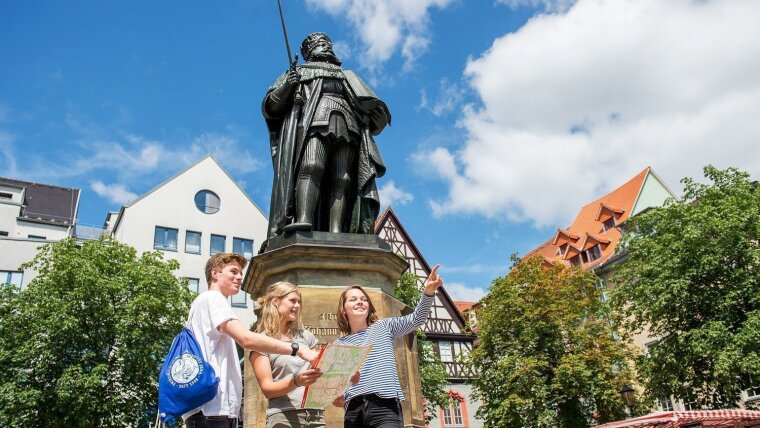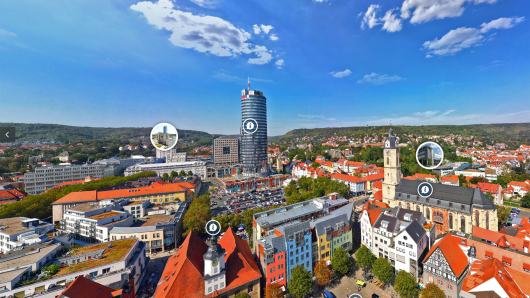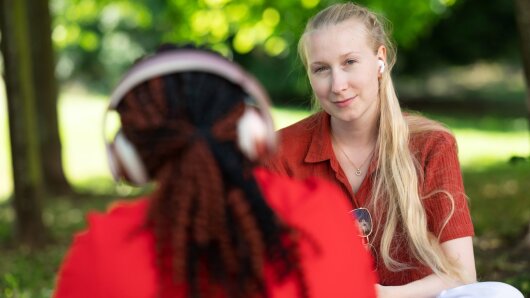Organizing your student life
-
Housing
We recommend that all international students apply for a room in a dormitory parallel to applying for studies.
The student services organizationExternal link Studierendenwerk Thüringen manages 21 halls of residence in Jena with a total of 3,000 places. There are a few individual apartments, however, most students stay in single rooms in shared flats with between one and eight other students, who share a kitchen and a bathroom.
The rent (approx. €200–350 per month) is fixed for a period of 6 months. This means that you have to pay higher monthly rent for a shorter period of use. The Studierendenwerk requires a deposit of €300 after concluding the tenancy agreement.
The application deadlines for international students are 15 January and 15 July for the following semester. However, as there are only a few rooms available, apply as soon as possible. Please do not forget to confirm your application and to accept the offer of a room by e-mail.
The monthly rent is due on the 3rd working day of the respective month. Students must submit a SEPA direct debit mandate (German or SEPA-compliant European account). International students without such an account have to transfer the first rent and deposit in advance, from the 2nd rent on a SEPA direct debit mandate is required. Cash payment on site is not offered. Please see the general regulations.External link
Private rooms, flats, shared flats
It is difficult to find a private room in Jena from abroad. We advise looking in neighbouring towns and cities, too (Weimar, Erfurt, Kahla, Gera, Apolda). It is best to do so using the Internet. There are many information boards in the university buildings displaying available rooms and flats. Please take note of our advicepdf, 469 kb · de on looking for accommodation and life in Jena in general.→ Episiode 3 of our Podcast "Uni Jena international" also tackles this topic.
-
Costs of and financing of studies, banks, blocked accounts
There are no tuition fees at the Friedrich Schiller University Jena. You just pay a small fee for courses in the language centre and sports centre, which are not on the curriculum.
All students have to pay a semester fee for the administration of the student body and the Studierendenwerk (approximately €255). This semester fee covers the use of local public transport in Jena and in Central Thuringia, and local trains throughout Thuringia for the entire semester. Students also pay far less for food in the canteen and cafeteria when they use their student ID.Money is mainly needed for accommodation, food, health insurance, books, clothing, and personal things. We recommend you a budget of €750-900 per month for everything.
- €0 tuition fees
- €45 semester fee with semester ticket (monthly)
- €300 rent (can be higher)
- €220 food
- €30 clothing, shoes
- €50 books, copies
- €120 health insurance
- €50 telephone, Internet, TV and radio licence fee
- €50 free time (individual)
Please take note of our advice on financing your studies, e.g. by working or scholarships. This page also contain information about banks and blocked accounts.
-
Working
There are various job opportunities in Jena. You should have at least good command of German if you want to have a choice among them. Jobs in which you do not need (much) German are rare, opten physically demanding, not very well paid and usually you have to commute to Erfurt/Gera for them.
When looking for a job, please observe the requirements of the German Immigration Law: non-EU citizens whose main reason for staying in Germany is studying can only work for 140 days (up to 8 hrs/day) or 280 half-days (up to 4 hrs/day) per year without a special work permit. This does not apply if you work as a student assistant (“studentische Hilfskraft”) or graduate assistant (“wissenschaftliche Hilfskraft”). Free-lance/Fee-paid work is considered self-employment and must therefore be permitted by the local Immigration Office beforehand.
Accept a work offer only if you have an employment contract and your employer is also paying social security contributions for you. Those working illegally may be liable to prosecution.
- General advice (tips and matters) [pdf, 203 kb] depdf, 138 kb · de
- University job boardExternal link
- Studierendenwerk’s job boardExternal link
- Jobs in JenaExternal link
- Welcome Centre Thuringia job databaseExternal link
- Tips on applyingExternal link
- Living and working in Thuringia: STAY projectExternal link
Get advice and more information about your job search at the Career Point!
-
Visa and residence permit
Travelling to Germany without a visa
EU citizens and citizens of Australia, Brazil, Canada, El Salvador, Honduras, Iceland, Israel, Japan, Liechtenstein, Monaco, New Zealand, Norway, San Marino, South Korea, Switzerland, United Kingdom and the USA. Please also note the information below (After arriving in Germany).
Travelling to Germany only with a visa
Citizens of all countries other than those stated above have to apply for an entry visa for study purposes from the embassy of the Federal Republic of Germany in their current country of residence before leaving. Submit the proof of admission you have received from the University with the visa application approximately two months before the beginning of the study programme. Do not travel to Germany with a tourist visa, a Schengen visa or a residence permit from another EU member state because these cannot be converted into student visas in Jena.
Special registration process for guest students/students of double-degree master’s programmes who
- are not an EU citizen and you study at a partner university within the EU, and
- have a student residence permit from one of the EU members which is valid longer than the planned guest stay in Germany (max. 360 days),
please refer to our informationpdf, 105 kb · de and fill in the registration formpdf, 520 kb · de as well as the proof of financial means.pdf, 203 kb · de
After arriving in Germany
All students have to register with their local residents’ registration office.
All non-EU citizens also have to register with the Immigration Office of their place of residence if their residence permits are not valid for long enough. Students from non-EU countries then have to apply for an electronic residence permit for study purposes (fee is approximately €110). Print a student certificate of enrolment from the Study Portal Friedolin 2.0External link after enrolling. All foreign students have to be able to prove how they are about to finance their stay in Germany. Proof of financing must be provided to the immigration office if necessary (this also applies for EU citizens). This proof should be issued and signed by your funding institution, your home university or your parents (or other private sponsors).
Please take note of the advice given by the German embassy in your country of residenceExternal link and the Jena Immigration OfficeExternal link.
Those wishing to work as well as study also have to follow the rules regarding the right of residence. Find out more information here.
-
Health insurance and other types of insurance
Health insurance
Students should have a valid health insurance for the duration of their studies.
Please see our information for
Please note that the International Office of the Friedrich Schiller University Jena does not accept any foreign, private travel insurance or emergency cover as student insurance. Although these are often necessary to apply for a visa in your home country and are also useful for your arrival and departure, they are not sufficient forms of full, proper health insurance. If you have any questions, please contact the International StudentsExternal link department of the International Office.
Further information about the German health care systempdf, 3 mb · de
Other types of insurance
The semester fee includes a premium for accident insurance. In all university buildings, on the way to and from the University, at University’s events, and during sports and leisure activities related to the University students are therefore covered by insurance. We strongly recommend taking out a private liability insurance for your personal life after arriving which will cover costs of damages to other persons's belongings.
-
Finding a doctor, studying with a disability or chronical illness, Mental Health First Aid
Call 112 if life is in danger. The hotline 116117 helps in non-emergency situations. The Emergency RoomExternal link is located in the Hospital Lobeda.
If it is not an emergency, search for a family doctor ("Allgemeinmedizin", "Praktischer Arzt", („Hausarzt“) close to where you live. You may find specialists (eyes, nose-throat-ears, gynecologist, dentist etc.) also at https://arztsuche.116117.de/pages/arztsuche.xhtmlExternal link
Here you can find a list of English-speaking doctorspdf, 523 kb · de in Jena. And here is a German-English health dictionaryExternal link. The WebseiteExternal link allows to research local doctors and filter their language competencies (Weitere Suchkriterien --> Fremdsprachenkenntnisse).
Further information about the German health care systempdf, 3 mb · de, also available in the multilingual guide "Health for allExternal link."
Students with a disability or chronical illness may find further information. If you need special treatment, make sure that your health insurance will cover the costs. Bring your special pharmaceutical drugs with you. Register at a special doctor soon after arrival to talk about treatment and prescriptions.
The Studierendenwerk offers a Psycho-Social Counselling.External link The University offers workshops at its Student Health Management and a Mental Health First Aid. Students of Psychology lend an ear on their Campus Couch de.
-
Radio/TV licence fee (“Rundfunkbeitrag”)
Everyone has to pay a monthly fee for German public radio and television. You even have to pay the fee if you do not own a radio or television or if you never listen to a public radio or watch a German television. There are only a few exceptions, e.g. those who receive a grant under the German Federal Training Assistance Act (Bundesausbildungsförderungsgesetz, BaföG).
Those living in a shared flat (including in halls of residence) can split the fee with their flatmates. Register as soon as you arrive in Germany. You can find more information on registering under licence feeExternal link.
-
Lost property
Please ask at the lost and found office of the city of JenaExternal link.
If you have lost something at the university, please ask the porter in the respective building.
-
Support for international students
Learn moreIt is very important to the Friedrich Schiller University Jena to provide good advice and support to its international students. Your academic success is important to us! You will find knowledgeable people to turn in the faculties and institutes, as well as in the administration department, who are always willing to help, also regarding social aspects. Immediately after your arrival and during your course, too, we offer you support, for example within the mentoring programme. If you experience difficulties, you can always turn to the International Office or to our ombudspersons.
Spending your spare time
-
Intercultural Café, workshops, international campus life, free time
The International Office invites you to the Intercultural Café and workshops which give you the opportunity to network and get some tips. Find out more about free time events and opportunities here.
-
Tips about sports, culture, night life, student groups
Learn moreThere is a lot to discover - for example small cafés and pubs, cosy cinemas, a creative theatre and many clubs for partying. The University Sports centre offers a variety of sports. Choirs and orchestras invite you to join in. With the culture ticket (thoska), theatres, museums and concert organisers offer discounts.
Do you also want to get involved in the university? Friedrich Schiller University has a wide range of activities on offer. Let us inspire you! -
Engage actively in university life
Learn moreYou are invited to get involved and pitch your ideas to improve student life in the University, either in official representative bodies or in informal student groups.
-
Learn and practice languages
Learn or practise foreign languages - for your studies, job search, social interaction. Use your study time to discover the world in this way and get into dialogue with other students!
The University Language Centre offers courses in many languages courses at (almost) all levels.
The philological departments de also offer language courses.
Outside the university, the Open UniversityExternal link (Volkshochschule) offers language courses. And there are various country get-togethers where you can talk to native speakers (for contact details, see notice boards/Facebook/Instagram).
-
(Post-)Migrant Self Organizations and Communities
In Jena, 17% of people have a migration background. People from all over the world live, study and work in Thuringia.
Many migrants and foreigners have organised themselves in groups and associationspdf, 83 kb · de. These self organizations offer access to the local community, opportunities for social engagement as well as support.
The Migration and Intergation Advisory BoardExternal link is elected every 5 years and represents the interests of all people with a migration background. -
Religious communities
Here you can find an overviewpdf, 85 kb · de of the religious communities in Jena. There are also university religious groups you might wish to join.
-
Semester ticket, public transportation, mobility
With the semester ticketExternal link (on their thoska), students can use local public transport in the VMTExternal link area and regional trains in Thuringia for the entire semester. You will receive your thoska after completing your enrolment.
Students can obtain the Deutschlandticket (subscription for public transport throughout Germany; no long-distance trains, cabs or private companies) from the subscription portal of the Jena public transport systemExternal link by crediting the semester ticket. Interested students must submit their application by the 10th of the previous month at the latest. The ticket is issued as a smartphone ticket.
Jena's local public transport JeNahExternal link offers bus and tram lines to all parts of the city. With the semester ticket, students can use these free of charge. The bus schedules can also be found in the DB NavigatorExternal link.
There are several long-distance bus providers. It's cheaper than taking the train, but you have to expect traffic jams and delays on the routes (Autobahn).
Trains of Deutsche Bahn and its partner companies (in Thuringia: Erfurter Bahn, Abellio) take their passengers to all parts of Germany. The network is very large and most places can be reached with only a few changes. However, one should always expect delays. You can search for travel options and book tickets in the DB NavigatorExternal link. Buying a Bahncard is recommended if you travel a lot and wish to save 25% or 50%. The Deutschlandticket or Sparpreis tickets are the cheapest, but have a train obligation, Flexprice tickets offer reductions and flexibility. Groups travel cheaper with group tickets (Thuringia ticket, Schönes Wochenende ticket). In Jena, there are three major stations: Westbahnhof (East-West connections), Paradiesbahnhof (North-South connections), and Göschwitz (all connections) and a few smaller stations on these routes. There are luggage lockers at Paradiesbahnhof.
Taking a cab is expensive. In Jena, you can usually get around quickly by JeNah, by bike or on foot. If you do need a cab, dial +49 3641 458888.
In Jena there are several stations of the car sharing service Teilauto. One can choose between different rates depending on the frequency of use. Sixt, Europcar and Avis operate throughout Germany. Before booking a car, international students should check whether their driver's license is valid in Germany.
New and used bikes or rental bikes are available e.g. at the bike shops Kemter, Kirscht, Bike&Snow, Bike Point. Cheap bikes can be had from second hand stores in Sophienstraße or Karl-Liebknecht-Straße. There are (still) few bike paths in Jena, watch our for the red marks, sometimes riding on the sidewalk is allowed. Wearing a helmet is recommended! In the dark, front and back lights are obligatory. It is not allowed to drive after drinking alcohol.
-
Discover Thuringia and Germany
The following websites provide a few tips for exploring the surrounding area and other regions in Germany. Most of them can be easily reached by public transport and the Germany Semester Ticket. Get to know the variety of German landscapes, dialects, festivals, traditions and typical dishes!
Learn more
Your contact person for questions on living in Jena is Dr Britta Salheiser, Team International Students of the International Office.



